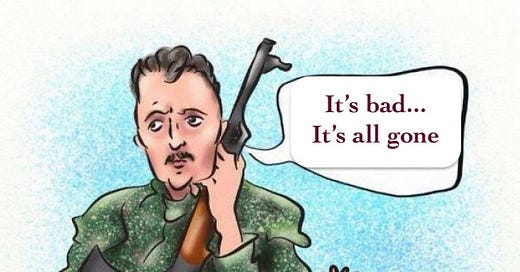On Friday, July 21, Igor Strelkov (Girkin) was detained in Moscow and subsequently placed under arrest by a court order. In 2014, he led a group of hitmen and initiated military actions on Ukrainian territory, which eventually escalated into full-scale Russian aggression against Ukraine.
Following the invasion of Ukraine on February 24, 2022, Girkin spent some time in the ranks of the Russian army but was later expelled and became an active commentator and propagandist of the war. However, he was arrested for extremism, which typically targets members of Islamic organizations and the liberal opposition in Russia. The motive behind such charges remains unclear…Girkin cannot be categorized as either.
The Moor has done his job; the Moor can leave. Or rather, even two Moors simultaneously—Strelkov/Girkin and Prigozhin. In my opinion, this is the way to explain what is happening.
It seems that both Strelkov and Prigozhin, who was also involved in inciting military-patriotic fervor in Russia, played significant roles in consolidating a powerful “war party” within Russian society, comprising approximately 20% to 25% of the population. As they gained prominence, they also developed political ambitions, albeit to varying degrees, which started to clash with the interests of the Kremlin tower, responsible for the March 17, 2024, referendum on Putin’s support.
Both Prigozhin and Strelkov emerged as influential critics of Putin from the right on the Russian political spectrum. They accused him of being too lenient and called for more aggressive actions. Unintentionally, their criticisms began to erode Putin’s approval rating, causing concern for the Kremlin, given the coming voting date. Although neither of them had any chance of participating in the election, their presence in the media space could sway a significant portion of their supporters to refrain from voting, affecting the overall outcome.
As a result, the Kremlin decided to minimize risks and remove the “Jacobins”
from the political landscape. Prigozhin was dispatched to work in Africa and train the Belarusian army, while the less-compliant Strelkov, considered a “Surkov1 legacy” and a useful idiot for the Kiriyenko-Vaino2 team, was placed in pre-trial detention and may face sentencing before March 17. The primary goal was to diminish the influence of both figures in the information flow.
The task of maintaining the “fire of war” likely will fall on Dobrodeev/Ernst3, at least until the March 17 deadline. And then, either the donkey or the padishah dies; in a word, why look so far ahead?—Russian politics is too situational and does not favor complex strategic constructions. Situational dynamics, which characterize Russian politics and complex strategic constructs, may not always find favor in this context.
In conclusion, recent events suggest a calculated effort by the Kremlin to remove influential figures like Prigozhin and Strelkov from the political arena, considering their potential impact on Putin’s support and broader political stability. However, the situation remains fluid and subject to further developments.
Vladislav Surkov was Putin’s advisor on domestic and Ukrainian policies from 2013 to 2020. Surkov was an architect of the Russian World (Russkyi Mir) concept.
Anton Vaino is Putin’s Chief of Staff; Sergey Kiriyenko is his deputy in charge of domestic policy.
Oleg Dobrodeyev is the CEO of the Russian Federal TV network (Rossiya channel); Konstantin Ernst is the CEO of the First Channel (Pervyi Kanal) federal TV.





I never knew of Strelkov yet you're the third Substack I'm reading that features him today.
Prigozhin's sudden appearance in Belarus, filmed addressing Wagner troops, makes me return to my previously stated opinion that it an intelligence operation and not an attempted coup. No clear verdict but he still stands, and more army leaders have been 'weeded'.